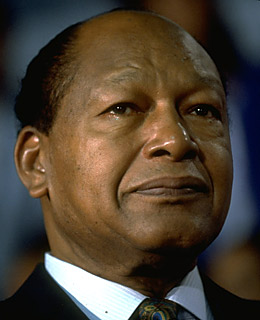
Former Los Angeles Mayor Tom Bradley.
In the aftermath of the riots, critics suggested that the usually mild-mannered Mayor Tom Bradley had actually made the already tense situation that much worse soon after the verdict came down when he declared, "Today that jury asked us to accept the senseless and brutal beating of a helpless man." It was a statement many said fanned the flames of the L.A. riots, but Bradley never apologized to his critics.
Bradley's term as the first African-American mayor of Los Angeles had begun in 1973 at a time when the city was just 15% black. During his 20 years as mayor, the city quickly became a much more racially diverse and complicated place to govern, and that was never more clear than on that fateful day. Bradley already had a very poor relationship with Daryl Gates, the chief of police, which had degenerated over the course of several years. Some critics suggested that this lack of communication with the police force made it harder for Bradley to manage the fast escalating crisis.
As the violence rose, he said only the city would "take whatever resources needed" to resolve the escalation. "Stay off the streets. It's anticipated that a curfew will be put into effect tomorrow night." He also declared a State of Emergency, prompting Gov. Pete Wilson to call in the California National Guard. Looting and fires spread from Pasadena to Compton and from Downtown to Westwood.
Shortly after the riots Bradley decided not to run for a sixth term. At the announcement, he made a plea that was more in keeping with his character: "The April unrest tore at my heart, and I will not be at peace until we have healed our wounds and rebuilt our neighborhoods. Let us all, every one of us, pledge to make Los Angeles a beacon of mutual respect, justice and tolerance from this day forward." Bradley suffered a stroke in 1996 and died in 1998 at the age of 80.
—Jesse Singal